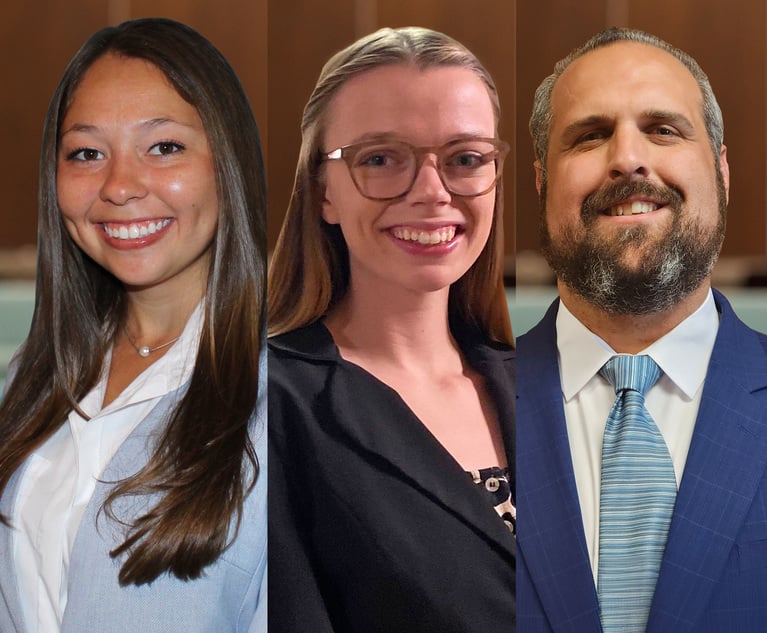Third Circuit's Paid Breaks Ruling a Bright Line, but Not an Open Door
A federal appeals court offered a clear rule earlier this year in holding that employees must be paid for breaks lasting 20 minutes or less, but private suits on that issue have been few, and appear poised to remain so, practitioners say.
November 28, 2017 at 03:33 PM
6 minute read

A federal appeals court offered a clear rule earlier this year in holding that employees must be paid for breaks lasting 20 minutes or less, but private suits on that issue have been few, and appear poised to remain so, practitioners say.
Employment lawyers on both the plaintiff and defense side acknowledged only a few pockets of wage-and-hour litigation on the paid-break issue, and usually in a different context than the one examined by the U.S. Court of Appeals for the Third Circuit in Department of Labor v. Progressive Business Publications, where the court said forcing employees to clock in and out for bathroom and other short breaks violated the federal Fair Labor Standards Act.
“This was an exemplary suit,” said Joshua Boyette, a partner at Swartz Swidler in Cherry Hill, a plaintiff firm. “I'm surprised it was challenged,” he said of the Wage and Hour Division's regulation setting out the 20-minute rule.
Joshua Vaughn, an associate in the Pittsburgh office of employment firm Littler Mendelson representing employers in wage-and-hour matters, said the paid breaks issue “is not a hot-button issue in private litigation,” and Progressive is “certainly not a wave-of-litigation case.”
“The primary reason is, the regulation is relatively clear,” Vaughn said. “Most employers know the 20-minute rule, and they're certainly not going to creatively argue [that it's not clear].”
The court, in issuing its precedential decision last Oct. 13, also saw it as clear. The defendant, Progressive Business Publications, implemented a system whereby employees were not paid after they were logged off for more than 90 seconds at their work stations. The company was accused of failing to pay minimum wage. It contended that the system, aimed at flexibility, was intended to benefit employees by allowing them to control their time, but the panel didn't see it that way.
“The policy that Progressive refers to as 'flexible time' forces employees to choose between such basic necessities as going to the bathroom or getting paid unless the employee can sprint from computer to bathroom, relieve him or herself while there, and then sprint back to his or her computer in less than 90 seconds,” Circuit Judge Theodore McKee said.
He continued, “If the employee can somehow manage to do that, he or she will be paid for the intervening period. If the employee requires more than 90 seconds to get to the bathroom and back, the employee will not be paid for the period logged off of, and away from, the employee's computer. That result is absolutely contrary to the FLSA.”
According to Mitchell Boyarsky, a partner in the employment and labor law group in the New York office of Gibbons, the court was “sort of calling out an employer's attempt to draft a workplace policy” that was a bit too creative.
“This is not a cutting-edge kind of decision,” he said. “The issue of compensability for breaks is a more commonly litigated issue when an employer fails to provide breaks, or [requires] off-the-clock work.”
Nevertheless, it is an issue that is litigated in some contexts. A claim of unpaid breaks “comes up in situations where there's some sort of creative payment scheme,” according to Boyette, who said he has handled cases where trucking companies are accused of failing to pay drivers for time spent off the road. In that context, truckers are typically paid by the day, not by the hour, and factoring in break time can cause a driver to be paid less than minimum wage, he said, or so the plaintiffs in such suits allege. Boyette noted two such cases he's handling, pending in federal courts in Nebraska and Tennessee.
According to another plaintiff-side attorney, Mitchell Schley of East Brunswick, the decision is “meaningful,” but “this issue has not been heavily litigated.”
“I cite cases about what's out there,” he said. “There's not much out there.”
Schley is involved in one class action implicating the 20-minute rule, on behalf of factory employees claiming their union previously agreed in negotiations with the employer that paid breaks could last only five minutes. That case is something of an aberration because the 20-minute rule “has been the rule for years,” he said.
Lawsuits could well flow from the Progressive ruling, but “it's hard to say,” Schley added. “Some companies take the position that if you're not working, you're not getting paid. … There's also companies that don't take that position.”
There's a practical reason why a flood of unpaid-breaks suits is unlikely, it seems: Boyarsky said most employers are not equipped or inclined to implement a system that could track employees' break time.
“For this to work, you would have to have technology that would record when an employee is physically not at their desk,” which is “a little more sophistication than an average employer's system is able to do,” he said.
But Boyette said such technology is becoming readily available.
“I don't think it's that complicated … for a company to try to implement this sort of a system,” he said of the Progressive system. “This case makes clear an employer needs to be careful about doing this.”
According to the defense-side lawyers, employers being careful is precisely why the 20-minute rule is seldom a litigation issue, and unlikely to become one, even in light of Progressive.
“Certainly the advice I give is not to do anything like this,” Boyarsky said.
Vaughn said the policy Progressive tried to institute was “not quite on the level” of a sophisticated tech firm, but certainly was in keeping with flexibility, employee freedom and advancing technology. In one way, it was commendable, but the intent didn't matter, he said.
“Most employers I'm aware of—it's just not worth the effort and possible risk,” Vaughn said. A system that tracks employee break time and still complies with the 20-minute rule is not inconceivable, he added, but “none come to mind that I'd be terribly comfortable recommending.”
This content has been archived. It is available through our partners, LexisNexis® and Bloomberg Law.
To view this content, please continue to their sites.
Not a Lexis Subscriber?
Subscribe Now
Not a Bloomberg Law Subscriber?
Subscribe Now
NOT FOR REPRINT
© 2025 ALM Global, LLC, All Rights Reserved. Request academic re-use from www.copyright.com. All other uses, submit a request to [email protected]. For more information visit Asset & Logo Licensing.
You Might Like
View All
Tensions Run High at Final Hearing Before Manhattan Congestion Pricing Takes Effect
4 minute read
On the Move and After Hours: Trenk Isabel; Connell Foley; Faegre Drinker; ABOTA Northern NJ Chapter
3 minute read

Lack of Available Auto Safety Features Does Not Equal Products Liability Act Violation, NJ Appeals Court Says
4 minute readTrending Stories
- 1Decision of the Day: Uber Cannot Be Held Vicariously Liable for Driver's Alleged Negligent Conduct
- 2TikTok Law and TikTok Politics
- 3California Supreme Court Vacates Murder Conviction in Infant Abuse Case
- 4New York’s Proposed Legislation Restraining Transfer of Real Property
- 5Withers Hires Lawyers, Staff From LA Trusts and Estates Boutique
Who Got The Work
Michael G. Bongiorno, Andrew Scott Dulberg and Elizabeth E. Driscoll from Wilmer Cutler Pickering Hale and Dorr have stepped in to represent Symbotic Inc., an A.I.-enabled technology platform that focuses on increasing supply chain efficiency, and other defendants in a pending shareholder derivative lawsuit. The case, filed Oct. 2 in Massachusetts District Court by the Brown Law Firm on behalf of Stephen Austen, accuses certain officers and directors of misleading investors in regard to Symbotic's potential for margin growth by failing to disclose that the company was not equipped to timely deploy its systems or manage expenses through project delays. The case, assigned to U.S. District Judge Nathaniel M. Gorton, is 1:24-cv-12522, Austen v. Cohen et al.
Who Got The Work
Edmund Polubinski and Marie Killmond of Davis Polk & Wardwell have entered appearances for data platform software development company MongoDB and other defendants in a pending shareholder derivative lawsuit. The action, filed Oct. 7 in New York Southern District Court by the Brown Law Firm, accuses the company's directors and/or officers of falsely expressing confidence in the company’s restructuring of its sales incentive plan and downplaying the severity of decreases in its upfront commitments. The case is 1:24-cv-07594, Roy v. Ittycheria et al.
Who Got The Work
Amy O. Bruchs and Kurt F. Ellison of Michael Best & Friedrich have entered appearances for Epic Systems Corp. in a pending employment discrimination lawsuit. The suit was filed Sept. 7 in Wisconsin Western District Court by Levine Eisberner LLC and Siri & Glimstad on behalf of a project manager who claims that he was wrongfully terminated after applying for a religious exemption to the defendant's COVID-19 vaccine mandate. The case, assigned to U.S. Magistrate Judge Anita Marie Boor, is 3:24-cv-00630, Secker, Nathan v. Epic Systems Corporation.
Who Got The Work
David X. Sullivan, Thomas J. Finn and Gregory A. Hall from McCarter & English have entered appearances for Sunrun Installation Services in a pending civil rights lawsuit. The complaint was filed Sept. 4 in Connecticut District Court by attorney Robert M. Berke on behalf of former employee George Edward Steins, who was arrested and charged with employing an unregistered home improvement salesperson. The complaint alleges that had Sunrun informed the Connecticut Department of Consumer Protection that the plaintiff's employment had ended in 2017 and that he no longer held Sunrun's home improvement contractor license, he would not have been hit with charges, which were dismissed in May 2024. The case, assigned to U.S. District Judge Jeffrey A. Meyer, is 3:24-cv-01423, Steins v. Sunrun, Inc. et al.
Who Got The Work
Greenberg Traurig shareholder Joshua L. Raskin has entered an appearance for boohoo.com UK Ltd. in a pending patent infringement lawsuit. The suit, filed Sept. 3 in Texas Eastern District Court by Rozier Hardt McDonough on behalf of Alto Dynamics, asserts five patents related to an online shopping platform. The case, assigned to U.S. District Judge Rodney Gilstrap, is 2:24-cv-00719, Alto Dynamics, LLC v. boohoo.com UK Limited.
Featured Firms
Law Offices of Gary Martin Hays & Associates, P.C.
(470) 294-1674
Law Offices of Mark E. Salomone
(857) 444-6468
Smith & Hassler
(713) 739-1250






